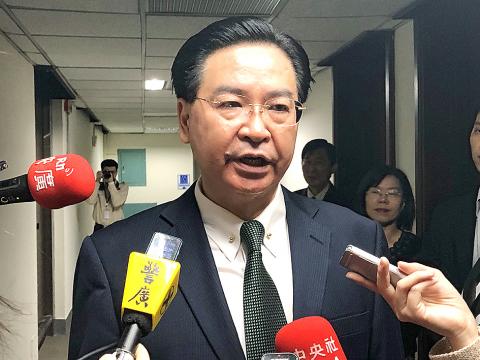Minister of Foreign Affairs Joseph Wu (吳釗燮) has called for Japan to engage in a security dialogue with Taiwan, as both nations have come under military pressure and threats from China.
In an interview with the Sankei Shimbun published yesterday, Wu called for Taiwan and Japan to initiate a security dialogue, saying that ensuring security is a shared responsibility of the two nations.
The newspaper called Wu’s call a rare move, as Taiwan has no diplomatic relations with Japan.

Photo: Lu Yi-hsuan, Taipei Times
Taiwan is looking forward to exchanges of views with Japan on ensuring security in light of increased activity by China’s armed forces in the Western Pacific in recent years and the threat it poses to both nations, Wu said.
Citing the close US-Taiwan security cooperation as an example, Wu said the lack of diplomatic ties with Japan should not be a hindrance to a security dialogue.
He also said that visits to Taiwan by high-ranking officials from the US administration have increased in frequency, while the administration of US President Donald Trump in June last year approved the sale of US$1.42 billion of arms to Taiwan.
The report said that after the US cut official diplomatic ties with Taiwan in 1979, then-US president Jimmy Carter signed the Taiwan Relations Act into law later that year, laying the legal foundation for security talks between the US and Taiwan.
There have been US military attaches assigned to the American Institute in Taiwan’s Taipei office since 2005, the report said.
In contrast, after Japan ended diplomatic relations with Taiwan in 1972, there has been a lack of legal foundation for exchanges between the two nations, the report said, adding that unofficial relations have only managed to bring about the appointment of one retired Japanese defense official to the Taipei office of the Japan-Taiwan Exchange Association.

SECURITY: As China is ‘reshaping’ Hong Kong’s population, Taiwan must raise the eligibility threshold for applications from Hong Kongers, Chiu Chui-cheng said When Hong Kong and Macau citizens apply for residency in Taiwan, it would be under a new category that includes a “national security observation period,” Mainland Affairs Council (MAC) Minister Chiu Chui-cheng (邱垂正) said yesterday. President William Lai (賴清德) on March 13 announced 17 strategies to counter China’s aggression toward Taiwan, including incorporating national security considerations into the review process for residency applications from Hong Kong and Macau citizens. The situation in Hong Kong is constantly changing, Chiu said to media yesterday on the sidelines of the Taipei Technology Run hosted by the Taipei Neihu Technology Park Development Association. With

CARROT AND STICK: While unrelenting in its military threats, China attracted nearly 40,000 Taiwanese to over 400 business events last year Nearly 40,000 Taiwanese last year joined industry events in China, such as conferences and trade fairs, supported by the Chinese government, a study showed yesterday, as Beijing ramps up a charm offensive toward Taipei alongside military pressure. China has long taken a carrot-and-stick approach to Taiwan, threatening it with the prospect of military action while reaching out to those it believes are amenable to Beijing’s point of view. Taiwanese security officials are wary of what they see as Beijing’s influence campaigns to sway public opinion after Taipei and Beijing gradually resumed travel links halted by the COVID-19 pandemic, but the scale of

A US Marine Corps regiment equipped with Naval Strike Missiles (NSM) is set to participate in the upcoming Balikatan 25 exercise in the Luzon Strait, marking the system’s first-ever deployment in the Philippines. US and Philippine officials have separately confirmed that the Navy Marine Expeditionary Ship Interdiction System (NMESIS) — the mobile launch platform for the Naval Strike Missile — would take part in the joint exercise. The missiles are being deployed to “a strategic first island chain chokepoint” in the waters between Taiwan proper and the Philippines, US-based Naval News reported. “The Luzon Strait and Bashi Channel represent a critical access

Pope Francis is be laid to rest on Saturday after lying in state for three days in St Peter’s Basilica, where the faithful are expected to flock to pay their respects to history’s first Latin American pontiff. The cardinals met yesterday in the Vatican’s synod hall to chart the next steps before a conclave begins to choose Francis’ successor, as condolences poured in from around the world. According to current norms, the conclave must begin between May 5 and 10. The cardinals set the funeral for Saturday at 10am in St Peter’s Square, to be celebrated by the dean of the College